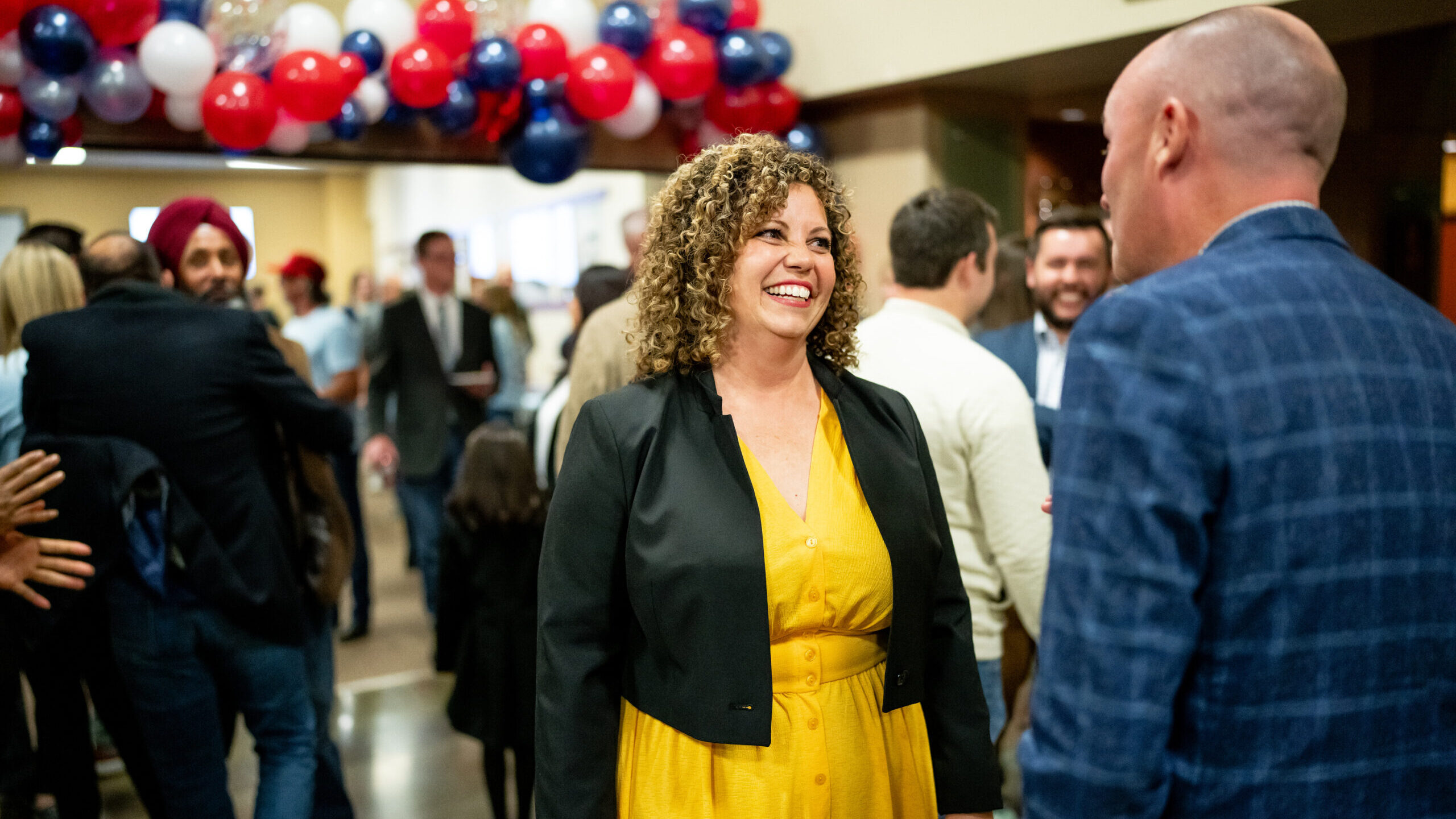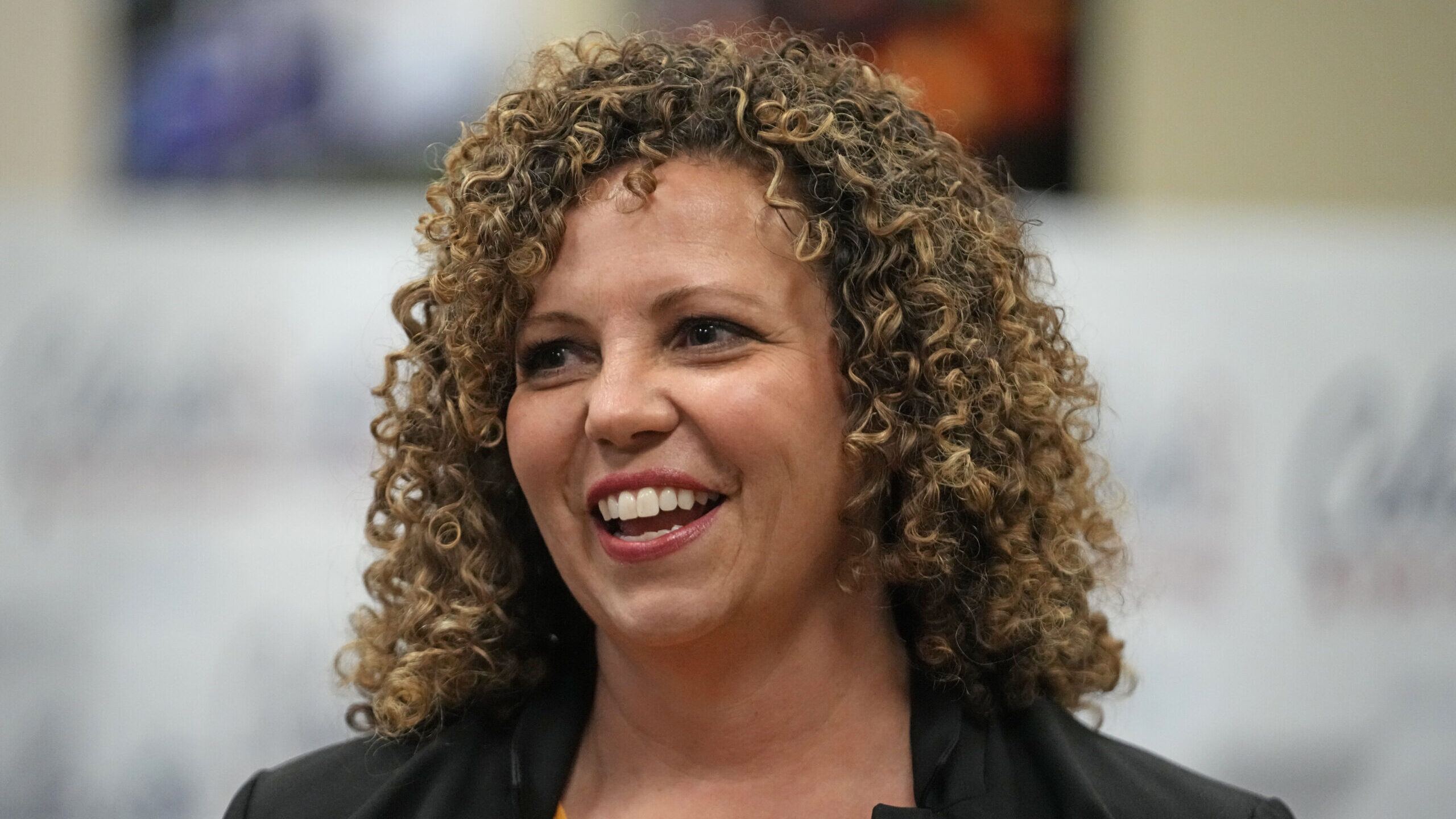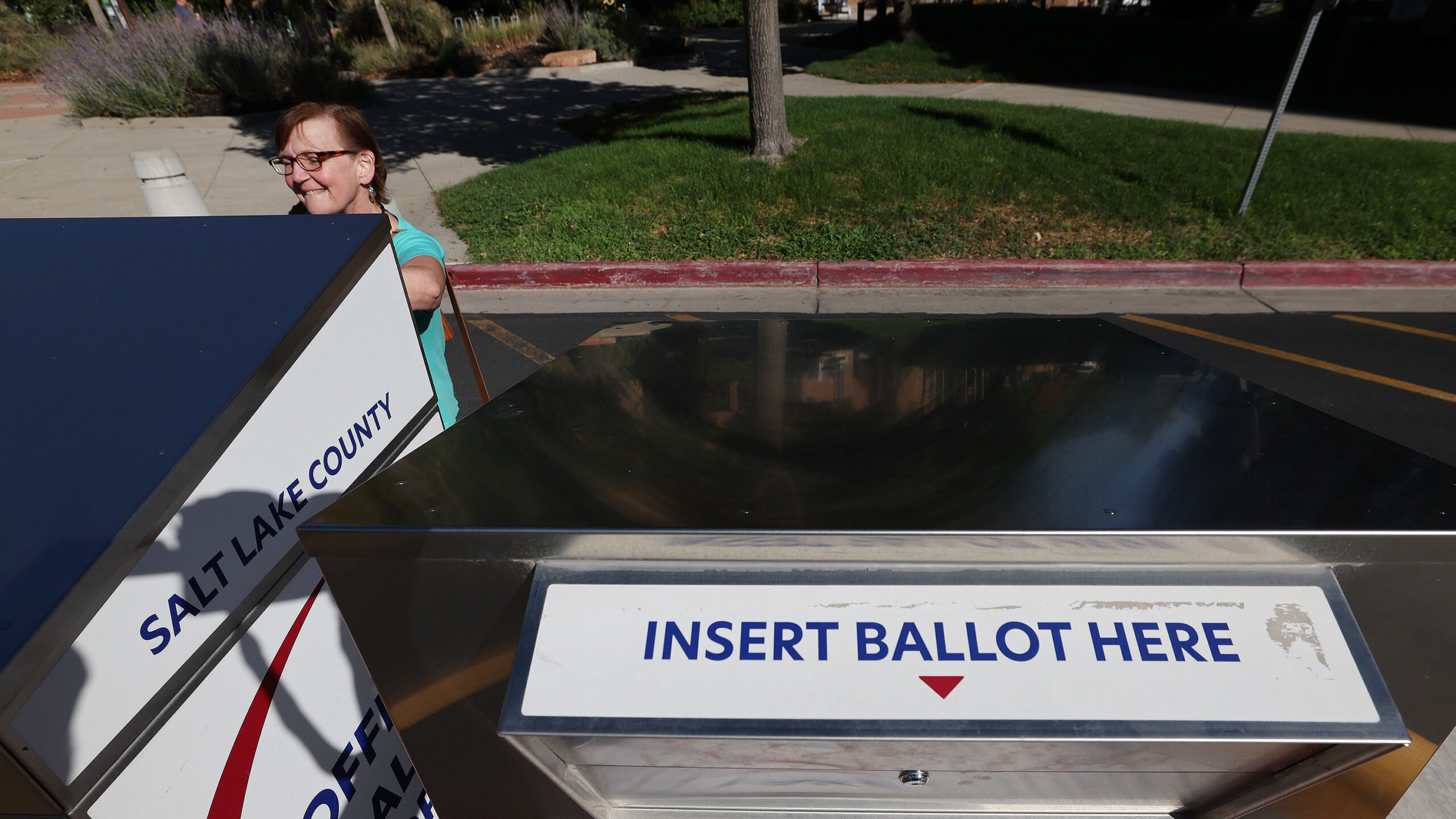2nd Congressional District candidate Brad Green in 8 questions
Aug 25, 2023, 5:00 AM
SALT LAKE COUNTY, Utah — He’s new(ish) to the Libertarian Party, but Brad Green isn’t a stranger to politics. Green served within the Utah County Republican Party leadership just three years ago.
KSL NewsRadio caught up with Green to ask eight burning questions of all the candidates on the ballot. A transcript of their full interview follows.
Brad Green’s stance on military
Kira Hoffelmeyer: So as you and I both know, this is the race to replace Republican Rep. Chris Stewart. He leaves as one of the only military veterans in Utah’s congressional delegation right now. So what do you think are the interests of Utah’s military bases that you think need protecting?
Brad Green: I agree with you that I don’t think anybody else in the race is a military veteran. My campaign manager is a disabled vet. And I have a unique perspective that I think I share with many military in that I’ve actually been shot.
I took three bullets while on an LDS mission in Brazil, and lived to tell about it. The details are on my website if somebody wants to read through the transcript of that write-up.
As far as the interests of Utahns, regarding military, I know that we have several bases in Utah.
The biggest interest that I have, personally, is that a lot of members of my family, my extended family especially, are members of the National Guard — Utah National Guard.
I think that oftentimes the National Guard is used, is conscripted by the federal government, to be our military, instead of the federal government doing the job of maintaining proper roles for our military.
We put our military as peacemakers, we bring in the Guard to do things.
I would actually sponsor legislation called “Defend the Guard”, which requires a declaration of war by Congress, and that it requires approval by the legislature in every state that’s going to send guard units to any active military conflict.
It’s significantly different right now. The President says, “Hey, we need the National Guard” … and there’s lots of discussion as to whether or not states can refuse that. This would clarify that.
So I actually am proposing that legislation at the federal level. And I know several states are trying to push that legislation through their state legislatures as well.
Brad Green’s stance on public lands
Kira Hoffelmeyer: Speaking of the federal government and the ways that we interact with them.. as is pretty well known about 60% to 70% of Utah land is federal land. And most of Utah’s congressional districts have some sort of interaction with federal land just given that number. How would you work with the federal government when it comes to public lands to ensure Utah’s best interests?
Brad Green: Yeah, that’s a really cool question. That’s actually one of my top three campaign issues.
There’s this equal footing doctrine that has not been followed very well at the federal level, which is that when, originally, the colonies were creating this government that we now know as the United States, they were arguing about land to a great extent.
Maryland, for example, was not really interested in allowing the other states to be able to keep the land that they had claimed. And so they agreed that any land outside of their currently existing borders would be territories that could be used for the United States, but only in creating new states. And those new states would be on equal footing with the existing states.
But when you get west of, you know, the Corn Belt — Colorado and West — virtually all of the states have a significant portion of land claimed by the federal government.
And in my reading of the documentation of the time, it’s unconstitutionally claimed by the federal government and so in Congress, I would fight to give that land or to cede that land appropriately back to those Western states to be used by the states either for public land or as those state legislatures see fit so that the government closer to the people gets to decide.
In Utah, I think that has a huge benefit.
As of right now, we have a lot of our land locked up. In one of the counties in my district, Garfield County, it’s like 92% — it’s crazy. And as a result, they suffer economically because if there are leases to use the land, the benefactor of those leases is not the local area.
And a lot of times they bring in these big national corporations. So it isn’t even locals that get to benefit from the land that they have continued to have stewardship over for their whole lives.
A lot of the people in southern Utah, specifically, a lot of ranching families, have been ranching on this land since before Utah statehood. And as a result of federal encroachment on those land rights, they’re very limited in what they can do, and we don’t get the best use out of our land.
We suffer economically, we suffer culturally. And we certainly suffer in our tax base for both local and state governments.
I think the federal government should cede that back. I think if they don’t, the legislators of the several states should sue the federal government for it.
I know that Utah is trying to do that right now. Rep. Ken Ivory has pushed for the attorney general’s office to advance that lawsuit and went so far as to withhold funding from the Attorney General’s office until they actually started the pursuit of that, and they have, they’ve actually started hiring counsel for that lawsuit right now. And I support that effort.
Brad Green and the shutdown showdown
Kira Hoffelmeyer: We hinted a little bit about this, so I’ll ask it a little bit more directly. The federal government, you know, operates the way that it operates. And one of the things that we’re constantly hearing out of Congress is about what we at KSL like to call a “shutdown showdown”. So basically, we’re talking about, you know, another vote in Congress to keep the business up and running. Basically, if you were elected, you’ll enter right in time for this, to be able to decide whether to keep funding the government or not. So what do you have to say about the state of the economy, inflation, spending… all that jazz?
Brad Green: It’s a really bad way to run the largest organization in the history of mankind.
And I think that the source of that problem is that we’ve deviated away from the constitutional principles of funding our government.
You know, originally it was designed, again, this is pre-16th Amendment, even. It was designed where the federal government would pass a budget, and then they would take that budget to the several states and they would say, “You have to pay your portion of this budget.”
So for example, if Utah is 1% of the population of these United States, Utah would be responsible for 1% of the budget of the federal government. And if you didn’t like what the federal government was spending money on, they would lobby Congress to rein in federal spending.
But if Congress did not pass a budget, the states wouldn’t… They would withhold funding, because it’s Congress’s job. It’s almost their only job that they’re actually required to do to pass a budget, and they haven’t done it in decades.
And as a result, it’s similar to what — I don’t know if you ever listen to Dave Ramsey on the radio. But you have people that call in, and he asks them about their budget. And a lot of times people have no idea what their budget looks like. They don’t know what they’re spending money on. They don’t know how much money they’re making.
That’s where our federal government sits. They’re running like a really poorly run household. They don’t know how much money they’re making, although oftentimes, they know that because they just raise the taxes how they see fit, but they don’t really know what they spend it on. They give it out to the several branches, and they don’t get adequately accounted reports back, especially when you start talking about some of the departments in the defense industry. They don’t get back really well-accounted-for expenditures.
And as a result, they can’t manage because can’t foresee the future because they haven’t budgeted for it. And they can’t hold anybody accountable for that budget.
And so they have this showdown, the “shutdown showdown” as you called it. And in my opinion, the shutdown showdown is a tool that can be used to try and get Congress back into its appropriate fiscal role. It’s inconvenient, and it’s uncomfortable, and it’s certainly contentious and controversial. And that’s all the adjectives that I can supply for that particular thing.
But what happens is, is that when the government does shut down, and we’ve seen it, the major operations, the significantly important, maybe the constitutionally required operations, still continue to be funded regardless, and it’s all of the unnecessary, unessential — I’m trying to remember what they call it… but it’s the other stuff that is not funded.
However, when they finally get done with it, everybody in the federal government got a vacation and they go back and pay them after the fact. And that’s a foolish way to do it, too.
Again, I think that the solution to this is to go back to constitutional fiscal responsibility. And I think I would prefer to have Ted Cruz’s approach.
He’s running a bill right now to repeal the 16th Amendment. So the federal government has to pass a budget before they can get paid, and they get paid directly from the state and then it’s the state’s responsibility to come up with what is the best taxation authority or mechanism to be able to fund their portion of the federal government’s expenditures.
However, a lot of people want to know what side I would come down on in a shutdown. And generally, I would come down on the side with the Freedom Caucus, and using that as leverage to get the government back to a reasonable fiscal policy, and actually rein back the spending of government and what, in Europe, they would call austerity measures.
I would absolutely support the government getting on the Dave Ramsey plan: Rice and beans and beans and rice. Sell everything that you don’t need to work, and balance your budget and get out of debt.
That’s how I would approach the federal finances.
Brad Green on where Congress + SCOTUS meet
Kira Hoffelmeyer: You mentioned contentious issues. So I’m going to ask about a contentious issue or 10. The Supreme Court has handed down decisions on a lot of divisive topics lately. You know, we’re talking abortion, affirmative action, all that kind of stuff. What do you see is the role of a member of Congress in all of what’s going on?
Brad Green: Okay, so those are two separate, clearly distinct issues. So I’m going to answer the latter first because I think that’s the core question you’re asking.
The role of a member of Congress is to represent their constituency and defend their constituents against federal overreach. And I don’t know that they’re doing that.
But in my opinion, the legislature is supposed to determine how the federal organization operates. And they have been very much ineffective at doing that, instead of actually making rules, they say, “We shall have this thing happen. And we have created a new agency, and it’s their job now to figure out what that means.”
For example, they say we shall have clean water, and we’ve established the EPA to decide what that means. And the EPA says, “Okay, well, let’s start with nobody gets to use our lakes and rivers in certain areas anymore.”
And not even for fishing, and we can’t put new fish in a river. And then they move on to say, “Okay, well, low lead brass isn’t good enough, we need no lead brass.”
And, you know, they don’t have any mechanisms scientifically to say that one is better than the other. And whether it’s appropriately good enough if they do have a scientific basis to justify the cost difference.
I operate in the plumbing industry in my business. The cost of brass has gone up about four times, just as a result of the low lead standards. And the people that I talked to, the old plumbers that have been operating for years, they have used lead pipes in their childhood, they used lead pipes and there were not significant effects from that. And yet, now we’re going from a quarter of a percent of lead in brass to an eighth of a percent or from .25 to .08.
And the cost is much higher. I think they have to use another heavy, dense, malleable metal like gold to fill in for brass.
And instead of Congress actually saying, “This is what we mean when we say we want something”… they just give it to the executive branch.
And now the executive branch has all the authority. I think it’s Congress’s job to actually fight out the differences and make it so that the federal government only does what’s absolutely necessary and most reasonable. And then the executive agencies don’t have any rulemaking authority, they just have to carry it out.
And that has changed. I don’t know that it ever worked the way that it’s supposed to, but that might be in the role of Congress.
Now, regarding the Supreme Court, I think the reason why a lot of these Supreme Court cases are so big and so contentious is because Congress didn’t do its job.
Specifically on abortion, the Supreme Court, everybody has had that as a contentious issue forever. And I think sometimes politicians like that because it gives them something that they can claim they’re going to fix, even though they clearly don’t have any authority.
And the recent Dobbs decision in the Supreme Court regarding abortion, in my opinion, was the most constitutionally sound decision I’ve seen from the court in a long time where they said, “Look, the federal government doesn’t have any authority here. If abortion is wrong, it’s wrong because it’s violence against a person and all violent crimes are adjudicated in and regulated by the state where they happened.”
That was essentially the Dobbs decision and I think that that’s a super well-conceived constitutional decision and it gives the power to the states, which was the constitutional intent.
Brad Green on running for re-election
Kira Hoffelmeyer: If elected, you’ll be in office… barely before you have to turn around and file to run again. How are you feeling about that?
Brad Green: You know, that’s a common question. And it brings to mind the reason why I’m doing this.
So I have a unique campaign, I am running as a Libertarian. And generally, people think I can’t win, because I’m running as a Libertarian.
However, I was a Republican until two years ago, and I saw the weakness of the Republican Party and their inability to really do a good job of refining their candidates.
And I make no claim about the current candidates. But when I was in the Republican Party two years ago, I was the Audit Committee Chairman, and I saw how the party constantly bounced its checks, bounced its rent checks several months while I was the auditor of the party because they just couldn’t fundraise, they couldn’t get to business, they didn’t have somebody watching the bank account enough to balance from the state account to the federal account under guidelines.
And you know, several high-level candidates and politicians were using the Republican Party to shuffle money around for their own purposes. And so when I ran as a Libertarian, I knew that there was deep dysfunction in the Republican Party. And there’s a lot of others that see that too.
And so I’m running with broad and deep Republican support. I fully expect after the primary, that the names that everybody, that are household names in the Republican Party… I expect dozens of them to endorse me.
And so why does that have anything to do with campaigning again for the next time? If I win as a Libertarian, it changes the game. Utah becomes the ultimate swing state for one election cycle.
Because everybody says, “Oh, no!” And the media is gonna love it.
Sorry, if your media. The media is gonna love it because the Republican Party is their favorite whipping boy. They love to beat up on the Republican Party.
And oftentimes, they have plenty of basis to do so. But what happens is they get to theorize, they get to question whether or not the Republican Party is on its way out, whether it’s going away and the Libertarian Party steps in as the new second party, because with a state like Utah that’s been Republican for so long.
You know, they start to question whether or not it’s now the Democrats, Libertarians, and then in other states, they may question whether it’s the Republicans and Libertarians, and it becomes a game-changer for all federal elections going forward.
And not that, not that I think that the Libertarian Party can take over as a second party, just letting people see that it’s possible, changes the game.
And whether or not I win a second term doesn’t matter so much as changing the game. Because the game that exists in 38 states leaves states without good representatives because there’s not steel sharpening steel.
You don’t have good competition leading to good candidates, good results, competition is necessary… and so by bringing strong competition, the more successful my campaign is, the more successful politics are across the nation as a result.
And if I don’t win re-election, or if I don’t even seek re-election, I will still have succeeded in my goal of strengthening the people’s ability to get strong candidates and obliterate the status quo.
Brad Green on some silly questions
Kira Hoffelmeyer: If you have to choose between Utah and BYU… which one do you pick?
Brad Green: You know, I live outside the Wasatch Front. I did live in Utah County for a long time. And as a result, I went to BYU games.
Here’s an added complication… this district has significantly more population along the Wasatch Front that actually cares about BYU and Utah. Significantly more Utah fans in my district.
But personally, I love football. I don’t watch a lot of college ball.
For me, it would be BYU. But I have a tie. A bright red BYU tie. Turns out BYU’s colors in Hawaii are red, white and gold. And when I visited down there, they gave me the tie.
Anyway, so I wear my red BYU tie anytime I’m in Utah County, just to mess with their heads, just to have that funny dialogue. But BYU would be my choice. I prefer to watch BYU and I kind of enjoy the quirky culture of BYU and BYU football.
Hoffelmeyer: Okay, I let you take a peek at a video before we started chatting. And so I just want to know, do you think that they’re humans in costume? Or are they sun bears?
Green: You know, that the video was weird. So my initial perception was that they were people in costumes.
However, as I continued to watch the video, I watched the ease with which they stood up. You know, maybe they have like CrossFit, you know, bodybuilders in costume. But I don’t, I just don’t see the muscular strength in most people, most cosplay costume artists, to stand up like that.
It did seem really awkward how they extended their neck straight up. I think, I think it probably really was a bear. A really different kind of bear that I’ve never seen before.
Hoffelmeyer: If the FBI were to do a background check on you or to do some sort of, you know, security clearance check, and they found something silly. And they brought it to you to be like, “Hey, Brad, explain this silly slash embarrassing.” What would that silly thing be?
Green: They could find serious things. I mean, I funded plane tickets for people that went to the January 6 rally. That would be more of a serious thing.
As far as a silly thing, I have been on social media since the beginning days of Facebook, and I have shared memes that would blow your mind.
Many of them have called for the absolute elimination of federal agencies, virtually all of them.
So if the FBI brought something to me that I thought was silly, that they cared enough about that they actually brought it to me, it would be the many calls that I have made to defund and abolish the FBI.
And some of those have very colorful language. Because lest we forget, I was raised in a plumbing supply house, and nothing is sacred among plumbers.
Those colorful social media interactions would absolutely blow people’s minds in the beltway, and they just kind of have to, they just have to understand that life is messy. And people are of all varieties, and we’re interesting and diverse.
This is part of a collection of questions asked to all candidates running in the 2nd Congressional District special election before the Sept. 5, 2023, primary election. See below for the interviews of the other candidates.













